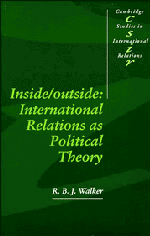Book contents
- Frontmatter
- Contents
- Preface
- 1 International relations as political theory
- 2 The Prince and ‘the pauper’
- 3 Ethics, modernity, community
- 4 History, structure, reification
- 5 Realism and change
- 6 The territorial state and the theme of Gulliver
- 7 On the spatio-temporal conditions of democratic practice
- 8 Sovereign identities and the politics of forgetting
- Notes
- Bibliography
- Index
6 - The territorial state and the theme of Gulliver
Published online by Cambridge University Press: 05 July 2011
- Frontmatter
- Contents
- Preface
- 1 International relations as political theory
- 2 The Prince and ‘the pauper’
- 3 Ethics, modernity, community
- 4 History, structure, reification
- 5 Realism and change
- 6 The territorial state and the theme of Gulliver
- 7 On the spatio-temporal conditions of democratic practice
- 8 Sovereign identities and the politics of forgetting
- Notes
- Bibliography
- Index
Summary
States and spaces
Although the state has long been the central category of almost all theories of international relations, specifications of the character and practices of states remain especially enigmatic in this context. The worst caricatures of the state are readily familiar here: the billiard ball or black box operating within determinist mechanical systems; the proliferating categories of early decision-making theory; the identification of politics only with the more or less formal institutions of government or the uncritical conflation of the categories of state and nation. At the other extreme, there are finely detailed analyses of the foreign policy-making processes of individual states in which the state is dissolved in the particularity and specificity of institutions, personalities and events. Even apart from these extremes, it would be difficult to argue that theories of international relations possess anything like an adequate account of the nature of the state or the diversity of state formations, or even that they show much concern for questions about the relative autonomy of states from civil society or economic determinations. After all, these are things that are supposed to come from those who are concerned with life within states rather than with relations between them.
This division of labour between political theory and theories of international relations has had important consequences for theories of the state, not least through the reduction of complex historical structures to little more than a point of transition between internal and external activities: between defence and foreign policy conceived as the limits of domestic politics within and the mere relations in which states are engaged without.
- Type
- Chapter
- Information
- Inside/OutsideInternational Relations as Political Theory, pp. 125 - 140Publisher: Cambridge University PressPrint publication year: 1992

